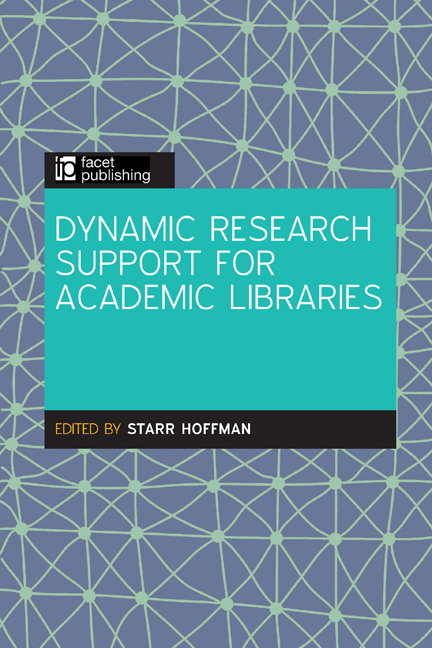Book contents
- Frontmatter
- Contents
- Editor and contributors
- Preface
- Introduction: a vision for supporting research
- PART 1 TRAINING AND INFRASTRUCTURE
- PART 2 DATA SERVICES AND DATA LITERACY
- PART 3 RESEARCH AS A CONVERSATION
- Introduction to Part 3
- 7 Implementing open access across a large university: a case study
- 8 Bridging the gap: easing the transition to higher education with an information literacy MOOC
- 9 Metadata enhancement through name authority in the UNT Digital Library
- Index
7 - Implementing open access across a large university: a case study
from PART 3 - RESEARCH AS A CONVERSATION
Published online by Cambridge University Press: 08 June 2018
- Frontmatter
- Contents
- Editor and contributors
- Preface
- Introduction: a vision for supporting research
- PART 1 TRAINING AND INFRASTRUCTURE
- PART 2 DATA SERVICES AND DATA LITERACY
- PART 3 RESEARCH AS A CONVERSATION
- Introduction to Part 3
- 7 Implementing open access across a large university: a case study
- 8 Bridging the gap: easing the transition to higher education with an information literacy MOOC
- 9 Metadata enhancement through name authority in the UNT Digital Library
- Index
Summary
Introduction and context
Edinburgh University Library is in the midst of undertaking a programme to facilitate the widespread adoption of open access (OA) to journal articles and conference proceedings across the entire University, in line with current UK higher education funding council policy.
Over the last few years there has been a significant increase in the number of institutional and research-funder policies mandating OA research results, taking advantage of both green and gold routes. In the UK, academic institutions and research centres have tended to mandate green OA, which is achieved by self-archiving into a repository. UK research funders have recognized that it is their responsibility not only to fund the original research, but also to ensure the widest possible dissemination of its results. For that reason, some funders do not limit their policies to green OA, but also extend them to gold OA, and take responsibility for covering gold article-processing charges (APCs) when they arise.
OA policy in the UK is evolving very rapidly, and in 2013 it was announced that from 2016, journal articles and conference proceedings must be deposited in a repository and made OA wherever this is possible (subject to publisher embargo), otherwise they would not be eligible for future research assessment exercises. For the first time in the UK, this policy has linked the OA agenda with research assessment – something which may have implications for university funding – and this has significantly increased the importance of OA to universities.
In this context, institutions need to work quickly to raise awareness of OA and to increase compliance with research-funder policies. The pace of change has increased significantly and universities are working to tight deadlines to ensure as many of their journal articles and conference proceedings as possible are eligible for assessment.
Background to open access in the UK and at the University of Edinburgh
There are approximately 110 universities in the UK, with the overwhelming majority (including all of the major research-intensive institutions) publicly funded through government grants.
Open access has been on the higher education agenda in the UK since the early 2000s, though it was a relatively low priority until 2012. The UK's Joint Information Systems Committee (Jisc) encouraged universities to adopt institutional repositories (IRs) via a number of initiatives in the early- and mid-2000s such as the London EPrints Access Project and the Repositories Support Project (Jisc, n.d., Jisc, 2009).
- Type
- Chapter
- Information
- Dynamic Research Support for Academic Libraries , pp. 107 - 118Publisher: FacetPrint publication year: 2016



